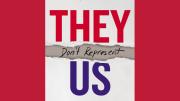Ask people in America whether “the people” rule, and “most would find the idea somewhat quaint,” writes Lawrence Lessig in the introduction to his new book They Don’t Represent Us (Dey St., $26.99), published for election day this year. “Everywhere, there is the view that democracy represents the elite.” He continues:
That an oligarchy or a monarchy would reward an elite is understandable. It’s built into the DNA. For a democracy to favor the elite over the people is to add insult to suffering. It is to betray the very promise at the core of the institution. It is to reveal, in a word, that the institution has been corrupted.
Lessig, who is Furman professor of law at Harvard Law School, argues that the responsibility for this failure lies partly with the system of elections in the United States, that elevates unrepresentative candidates to political office, and partly with “us,” the voters, who have become increasingly partisan and/or uninformed about critical issues.
The book provides a map for thinking about what needs to be reformed. Lessig argues that:
- Political campaigns must be publicly funded, particularly in congressional elections.
- The Electoral College that selects the president must be reformed, including by adopting proportional voting to select electors within each state.
- Gerrymandering must be stopped, because the way electoral maps are currently drawn systematically disenfranchises certain voters.
- The Senate needs to be radically reformed, including by allocating votes for leadership based on population, and potentially allocating more senators to the most populous states.
- Registration to vote should be automatic, and states that don’t provide equal access to citizens so that they can vote should be subject to a federal financial penalty.
He also believes that, when asked to make decisions at the ballot box, even relatively well-informed voters don’t know enough about many issues, and even in some cases, about candidates (particularly for local office), to be able to vote wisely. He suggests combating this problem by attacking it from both sides. On the one hand, he proposes reducing the number of elective offices (there are currently 500,000 elected officials in the United States, according to Lessig) so that voters are not forced to choose among candidates they know little about. At the same time, he suggests the creation of new political institutions designed to empower the silent majority with respect to issues of importance: “civic juries” that would be representative bodies picked randomly the way they are in the current jury system, to make non-binding recommendations in political discussions; and even empowered bodies of similarly chosen citizens gathering from across the country in “shadow” conventions and congresses to consider politically fraught issues such as gun control.
Lessig has been an outspoken voice against corruption in various forms. Hear him speak about “academic corruption” on the Harvard Magazine podcast, “Ask a Harvard Professor.”








